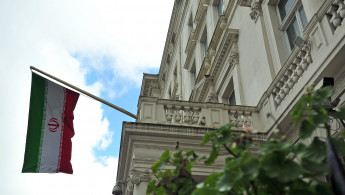Iran 'deliberately denying' political prisoners medical care
Iranian authorities are putting the lives of political prisoners at serious risk by denying them adequate medical care, according to Amnesty International.
A report from the London-based rights group published on Monday accused Iran of deliberately preventing medical care for prisoners of conscience in an "intentional act of cruelty" aimed at intimidating and extracting forced confessions.
"In Iran a prisoner's health is routinely taken hostage by the authorities, who recklessly ignore the medical needs of those in custody. Denying medical care to political prisoners is cruel and utterly indefensible," said Philip Luther, Director of Amnesty International’s Middle East and North Africa Programme.
"Prisoners' access to health care is a right enshrined in both international and Iranian law. When depriving a prisoner of medical care causes severe pain or suffering and it is intentionally done for purposes such as punishment, intimidation or to extract a forced 'confession', it constitutes torture."
The report details 18 cases of prisoners who have been denied medical care and are at risk of suffering permanent damage to their health.
One of them, Zeynab Jalalian, who is serving a life sentence for her alleged membership of a Kurdish opposition group is at risk of going blind because her treatment has been withheld.
 |
|
| Jalalian has been denied urgent eye surgery [Amnesty] |
She suffered the injuries when interrogators beat her head against a wall, fracturing her skull and causing her vision impairment, Jalalian's family believes.
Authorities have reportedly told her she must "confess" before will be allowed to be transferred to hospital for urgent eye surgery.
Another prisoner Omid Kokabee, a physicist serving a 10-year sentence for refusing to work on military projects in Iran, was denied treatment for kidney problems for nearly five years.
In April 2016, he was diagnosed with advanced kidney cancer and had to undergo emergency surgery to remove his right kidney.
Iranian officials have reportedly used local media to deny reports of mistreating prisoners.
"The Iranian authorities and in particular the prosecution authorities have displayed a chilling ruthlessness in their attitude towards sick prisoners. They are toying with individuals' lives with devastating, lasting consequences to their health," said Philip Luther.
"Iran's authorities must immediately stop using the denial of medical care as a form of punishment or coercion and ensure all people in custody are able to access adequate health care without discrimination."

![sudan women [getty] sudan women [getty]](/sites/default/files/styles/image_330x185/public/media/images/5019D7F4-52AF-4377-8A05-885D27476479.jpg?h=d1cb525d&itok=tKXV7r-W)
